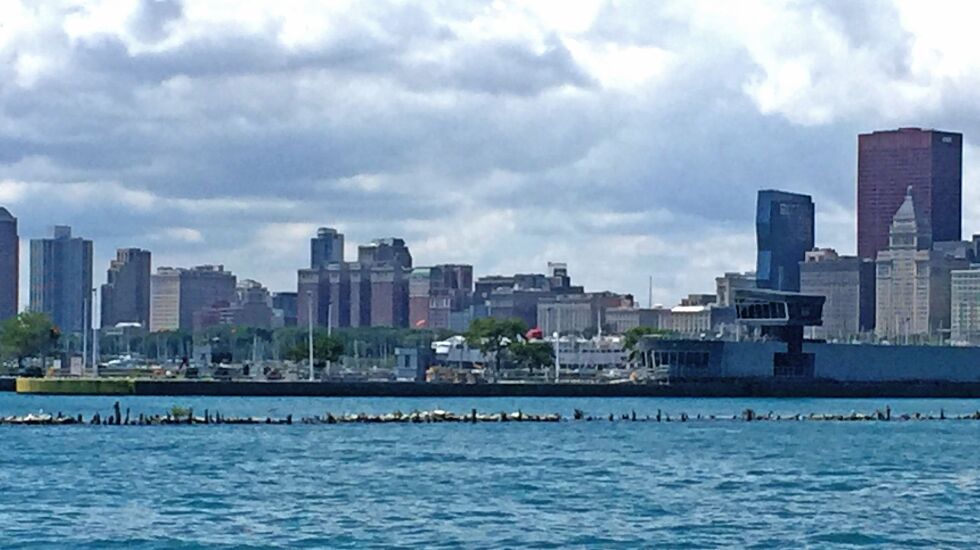
My first cousin’s daughter is ... what? My second cousin? No, those are more distant kinfolk who only share great-grandparents. My mother’s sister’s son’s daughter is my first cousin, once-removed.
I think.
Whatever she is, my 18-year-old relation and her bestie came to visit with us for almost a week in July.
Six days. Having readily agreed to the visit, in concept, I did blink a few times when informed of the specific span, thinking of a Yiddish word, mishpocha, which means “family.” And the obligations thereby implied.
Sure, I said, yes yes, of course, a week is fine ... though I still have to work. As long as I’m not expected to squire the teens about the city, they’re welcome to use our house as a base for their explorations.
That said, the unwritten code of familial responsibility dictates that I pick them up at the airport, buy a welcome lunch and host their initial foray into the city. What’ll it be, girls? Navy Pier? Most popular attraction in Chicago. A ferris wheel. Plenty of shops selling tat. Fireworks at night.
Or ... the Art Institute. The Cezanne show. I was secretly pulling for that.
Or ... if you kids are tired from your long trip, we could just walk in the Chicago Botanic Garden. (The “easiest for me” was unvoiced).
They chose that last option. Youth is wasted on the young.
Driving there, we passed a Walgreen’s.
“We need to stop at Walgreen’s,” one of my visitors said.
I know better than to quiz young women about what kind of necessity might inspire a visit to a drug store. But the purpose of the stop was revealed: Before they could venture into Chicago, they needed to buy pepper spray. They would have bought it before leaving Boston, but couldn’t take it on the plane.
Ah.
Chicago is the 20th most violent city in the country. Half the violent crime of St. Louis, which is Number One. Half of Detroit, Baltimore and Memphis. Significantly less than Milwaukee or Albuquerque or Rockford.
Rockford!
So why would first time visitors be motivated to arm themselves? Bad press, obviously. A former president who relishes using Chicago as a dog whistle. A generation of craven haters who’ve mastered the racist code. You can’t rave about Jew financiers anymore. But George Soros is fair game. You can’t rage about Black and Brown people, at least not in the stark terms of yore. But you sure can kick Chicago.

Yes, Chicago has a criminal reputation. Al Capone, bang bang bang. And yes, Chicago has significantly worse crime than New York City, which once held the title as America’s fear capital. There’s no way around it.
Pulling into the Walgreen’s parking lot, I told my visitors that while they were adults, free to do as they please, I would advise against pepper spray.
“You’ll never need it, particularly where you’ll be going in the city, and any situation where you could conceivably need it would only be made worse by having it,” I said, my general take on weapons.
I stayed in the car.
When I later ran this line of reasoning past my wife, she didn’t agree, explaining that, not being a woman, I didn’t understand the fear factor. That the spray, while perhaps unnecessary from a practical viewpoint, might still have psychological value, making them more confident when exploring the city.
The six days shot by. The pair were the easiest houseguests ever, sleeping until noon, hopping on the Metra to visit The Art Institute and the Museum of Science and Industry, plus Chinatown, twice.
Or so they told me, and I chose to believe them. Maybe they were actually sneaking away to frequent some 24-hour underground rave party, hidden in an industrial area, jammed on the vast, multi-level dance club, hands fluttering toward the ceiling, swaying to throbbing techno-rap-whatever-the-heck-kids-listen-to-nowadays in a sweaty, foam-filled room with their new friends. I sure hope so.
Whatever they did, when time came for our guests to go, as I was driving them to the airport — mishpocha! — I reminded them that if they’d indeed bought pepper spray, they’d better leave it behind, and not try to sneak it through airport security. I could keep it for when they return next year. They said no, they hadn’t bought any. It did not turn out to be necessary.








